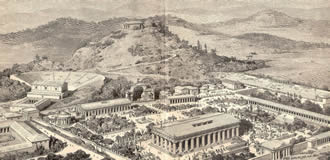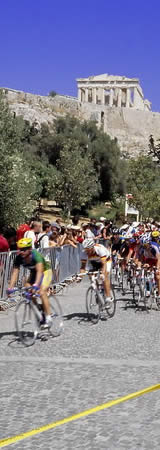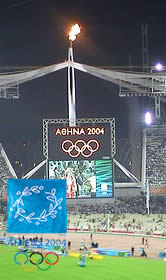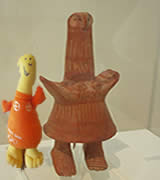
















Ancient olympia history


Dimas
Athens 2004
Historical Figures
Athens 2004 ----------->


The Athens 2004 Summer Olympic Games were celebrated in Athens, Greece, from August 13 to August 29, 2004. 11,099 athletes competed, some 600 more than expected, accompanied by 5,501 team officials from 202 countries. Athens 2004 marked the first time since the 1996 Summer Olympics that all countries with a National Olympic Committee were in attendance. There were 301 medal events in 28 different sports. For the Athenias was the biggest event of the modern history of Athens city.
-Popularity in the Games reached soared to new highs as 3.9 billion people had access to the television coverage compared to 3.6 billion for Sydney 2000. Women's wrestling was included in the program for the first time. Swimmer Michael Phelps won 6 gold medals and set a single-Games record with 8 total medals. Leontien Ziljaard-van Moorsel became the first female cyclist to earn 4 career gold medals and 6 total medals, while canoeist Birgit Fischer became the first athlete in any sport to win two medals in each of 5 Olympics. Runner Hicham El Guerrouj won both the 1,500m and the 5,000m, while on the women's side Kelly Holmes triumphed in both the 800m and the 1,500m. In team play, Argentina won the men's football tournament without giving up a goal, and the U.S. softball team won by outscoring their opponents 51-1.
The widely praised Opening Ceremony by avant garde choreographer Dimitris Papaioannou held on August 13, 2004 began with a twenty eight (the number of the Olympiads up to then) second countdown paced by the sounds of an amplified heartbeat. As the countdown was completed, fireworks rumbled and illuminated the skies overhead. After a drum corp and bouzouki players joined in an opening march, the video screen showed images of flight, crossing southwest from Athens over the Greek countryside to ancient Olympia. Then, a single drummer in the ancient stadium joined in a drum duel with a single drummer in the main stadium in Athens, joining the original ancient Olympic games with the modern ones in symbolism. At the end of the drum duet, a single flaming arrow was launched from the video screen (symbolically from ancient Olympia) and into the reflecting pool, which resulted in fire erupting in the middle of the stadium creating a burning image of the Olympic rings rising from the pool. The Opening Ceremony was a pageant of traditional Greek culture and history hearkening back to its mythological beginnings. The program began as a young Greek boy sailed into the stadium on a 'paper-ship' waving the host nation's flag to haunting music by Hadjidakis and then a centaur appeared, followed by a gigantic head of a cycladic figurine which eventually broke into many pieces symbolising the Greek islands. Underneath the cycladic head was a Hellenistic representation of the human body, reflecting the concept and belief in perfection reflected in Greek art. A man was seen balancing on a hovering cube symbolising man's eternal 'split' between passion and reason followed by a couple of young lovers playfully chasing each other while the god Eros was hovering above them. There followed a very colourful float parade chronicling Greek history from the ancient Minoan civilization to modern times.
Although the National Broadcasting Company in the United States presented the entire opening ceremony from start to finish, a topless Minoan priestess was shown only briefly, the breasts having been pixelated digitally in order to avoid potential fines by the Federal Communications Commission Also, lower frontal nudity of men dressed as ancient Greek statues was shown in such a way that the area below the waist was cut off by the bottom of the screen. In most other countries presenting the broadcast, there was no censorship of the ceremony.
- 202 National Olympic Committees marched in the Parade of Nations at the Opening Ceremony. Traditionally Greece leads the parade and the host team goes last. Because Greece was the host, they occupied both positions, as weightlifter Pyrros Dimas opened the parade and the rest of the Greek athletes entered at the end.


The mascots were based on this clay model at the National Archaelogical Museum







